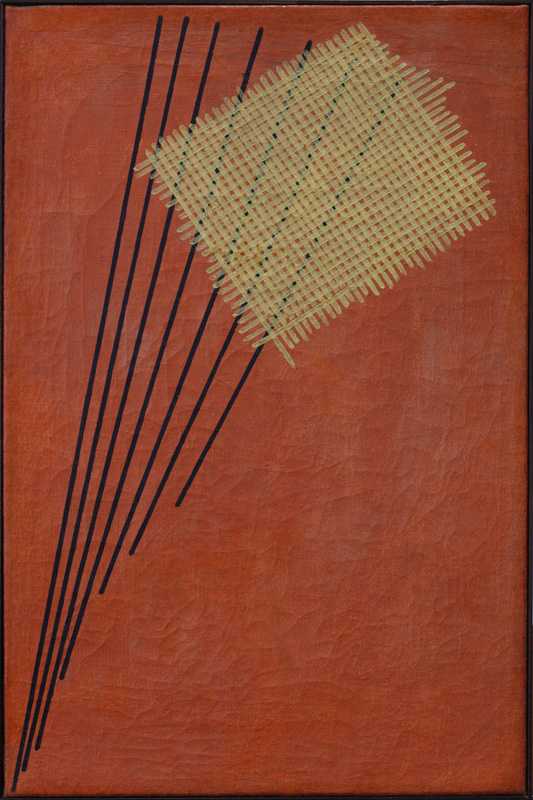THE RAY OF DISPLACEMENT (3)
By:
January 21, 2024

Construction no. 95 (1919)
Harriet Prescott Spofford’s “The Ray of Displacement” — which makes the shocking suggestion, at one point, that Jesus may have been a dimension-hopping scientist — was first published October 1903 in The Metropolitan Magazine, with illustrations by Lester Ralph. It has appeared in proto-sf collections edited by Sam Moskowitz, Mike Ashley, and others. HiLoBooks is pleased to serialize it here for HILOBROW’s readers.
ALL INSTALLMENTS: 1 | 2 | 3 | 4 | 5 | 6 | 7 | 8.
“It is the atmosphere of a fire-dissolving planet,” I thought. And then there was darkness and a strange odor.
I fumbled and stumbled about till I could let in the fresh air; and presently I saw the dim light of the street lamp. Then I turned on my own lights — and there was the quartz slab with a curious fusing of its edges, and in the center, flashing, palpitating, lay the diamond, all fire and whiteness. I wonder if it were not considerably larger; but it was hot as if just fallen from Syra Vega; it contracted slightly after subjection to dephlogistic gases.
It was near morning when, having found Brant’s address, I passed into his house and his room, and took my bearings. I found his waistcoat, left the diamond in one of its pockets, and returned. It would not do to remain away, visible or invisible. I must be vindicated, cleared of the charge, set right before the world by Brant’s appearing and confessing his mistake on finding the diamond in his pocket.
Judge Brant did nothing of the kind. Having visited me in my cell and in vain renewed his request to share in the invention which the habit of his mind convinced him must be of importance, he appeared against me. And the upshot of the business was that I went to prison for the term of years he had threatened.
I asked for another interview with him; but was refused, unless on the terms already declined. My lawyer, with the prison chaplain, went to him, but to no purpose. At last I went myself, as I had gone before, begging him not to ruin the work of my life. He regarded me as a bad dream, and I could not undeceive him without betraying my secret. I returned to my cell and again waited. For to escape was only to prevent possible vindication. If Mary had lived — but I was alone in the world.
The chaplain arranged with my landlord to take a sum of money I had, and to keep my rooms and apparatus intact till the expiration of my sentence. And then I put on the shameful and degrading prison garb and submitted to my fate.
It was a black fate. On the edge of the greatest triumph over matter that had ever been achieved, on the verge of announcing the actuality of the Fourth Dimension of Space, and of defining and declaring its laws, I was a convict laborer at a prison bench.
One day Judge Brant, visiting a client under sentence of death, in relation to his fee, made pretext to look me up, and stopped at my bench. “And how do you like it as far as you’ve gone?” he said.
“So that I go no farther,” I replied. “And unless you become accessory to my taking off, you will acknowledge you found the stone in your pocket —”
“Not yet, not yet,” he said, with an unctuous laugh. “It was a keen jest you played. Regard this as a jest in return. But when you are ready, I am ready.”
The thing was hopeless. That night I bade good-bye to the life that had plunged me from the pinnacle of light to the depths of hell.
When again conscious I lay on a cot in the prison hospital. My attempt had been unsuccessful. St. Angel sat beside me. It was here, practically, he came into my life — alas! that I came into his.
In the long nights of darkness and failing faintness, when horror had me by the throat, he was beside me, and his warm, human touch was all that held me while I hung over the abyss. When I swooned off again his hand, his voice, his bending face recalled me. “Why not let me go, and then an end?” I sighed.
“To save you from a great sin,” he replied. And I clung to his hand with the animal instinct of living.
I was well, and in my cell, when he said. “You claim to be an honest man —”
“And yet?”
“You were about taking that which did not belong to you.”
“I hardly understand.”
“Can you restore life once taken?”
“Oh, life! That worthless thing!”
“Lent for a purpose.”
“For torture!”
RADIUM AGE PROTO-SF: “Radium Age” is Josh Glenn’s name for the nascent sf genre’s c. 1900–1935 era, a period which saw the discovery of radioactivity, i.e., the revelation that matter itself is constantly in movement — a fitting metaphor for the first decades of the 20th century, during which old scientific, religious, political, and social certainties were shattered. More info here.
SERIALIZED BY HILOBOOKS: James Parker’s Cocky the Fox | Annalee Newitz’s “The Great Oxygen Race” | Matthew Battles’s “Imago” | & many more original and reissued novels and stories.
